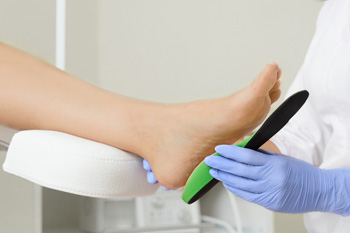January 2022
What to Do With a DFU
A DFU, or diabetic foot ulcer, is an unfortunately frequent complication of diabetes. Caused by a combination of high blood glucose levels, poor circulation, nerve damage, and immune insufficiency, DFUs are dangerous wounds that can form on the feet. These wounds typically heal slowly and poorly, and so they often require medical care. It is suggested that you call your podiatrist if you have a DFU and notice any new pain, drainage, discoloration, swelling, foul odor, or dead tissue at the site of the ulcer. You also may wish to seek medical treatment if the DFU increases in size or depth, or if it doesn’t heal. Some treatments that may help at the doctor’s office include debridement to remove dead tissue, medicated bandages, off-loading using orthotics, and surgery. If you have diabetes, it is suggested that you be under the regular care of a podiatrist.
Wound care is an important part in dealing with diabetes. If you have diabetes and a foot wound or would like more information about wound care for diabetics, consult with one of our podiatrists from Central Ohio Comprehensive Foot Care. Our doctors will assess your condition and provide you with quality foot and ankle treatment.
What Is Wound Care?
Wound care is the practice of taking proper care of a wound. This can range from the smallest to the largest of wounds. While everyone can benefit from proper wound care, it is much more important for diabetics. Diabetics often suffer from poor blood circulation which causes wounds to heal much slower than they would in a non-diabetic.
What Is the Importance of Wound Care?
While it may not seem apparent with small ulcers on the foot, for diabetics, any size ulcer can become infected. Diabetics often also suffer from neuropathy, or nerve loss. This means they might not even feel when they have an ulcer on their foot. If the wound becomes severely infected, amputation may be necessary. Therefore, it is of the upmost importance to properly care for any and all foot wounds.
How to Care for Wounds
The best way to care for foot wounds is to prevent them. For diabetics, this means daily inspections of the feet for any signs of abnormalities or ulcers. It is also recommended to see a podiatrist several times a year for a foot inspection. If you do have an ulcer, run the wound under water to clear dirt from the wound; then apply antibiotic ointment to the wound and cover with a bandage. Bandages should be changed daily and keeping pressure off the wound is smart. It is advised to see a podiatrist, who can keep an eye on it.
If you have any questions, please feel free to contact one of our offices located in Delaware and Westerville, OH . We offer the newest diagnostic and treatment technologies for all your foot care needs.
The Benefits That Losing Weight Has on Your Feet
Being overweight can cause discomfort and damage to your feet. The excess fat you are carrying around redistributes itself throughout your body, and your feet are no exception. Extra fat can deposit in your feet and the fat pads on the bottom of your feet can get worn down. Your feet may even become flat. Being obese may make you more susceptible to developing plantar fasciitis, bunions, hammertoe, and more. While losing weight will not change the structure of your feet, it can help to take pressure off your feet and ankles and help you avoid osteoarthritis, gout, and joint pain. It can also relieve foot pain and inflammation due to circulatory issues. Contact a podiatrist to get relief from your foot pain and to learn various solutions about taking better care of your feet.
Obesity has become very problematic at this point in time and can have extremely negative effects on the feet. If you’re an obese individual and are concerned about your feet, contact one of our podiatrists from Central Ohio Comprehensive Foot Care. Our doctors can provide the care you need to keep you pain-free and on your feet.
Obesity and Your Feet
Since your feet are what support your entire weight when standing, any additional weight can result in pain and swelling. Being overweight is one of the main contributors to foot complications.
Problems & Complications
Extra Weight – Even putting on just a few extra pounds could create serious complications for your feet. As your weight increases, your balance and body will shift, creating new stresses on your feet. This uneven weight distribution can cause pain, even while doing the simplest tasks, such as walking.
Diabetes – People who are overweight are at serious risk of developing type-2 diabetes, which has a drastic impact on the health of your feet. As you get older, your diabetes might worsen, which could lead to loss of feeling in your feet, sores, and bruises. You could also become more prone to various infections.
Plantar fasciitis – Pressure and stress that is placed on muscles, joints, and tendons can trigger plantar fasciitis, which is an inflammation of tissue that forms along the bottom of the foot.
If you have any questions please feel free to contact one of our offices located in Delaware and Westerville, OH . We offer the newest diagnostic and treatment technologies for all your foot and ankle needs.
Is My Broken Foot an Emergency?
 The foot consists of 26 bones. When one or more of these bones are broken, it is known as a foot fracture. Although it may sound frightening, a broken foot is not always an emergency. Whether or not you should rush to the ER depends on the severity of the injury. If you are experiencing mild pain, swelling, and bruising, you should schedule an appointment with a podiatrist. If, however, you have moderate to severe pain, swelling, bruising, visible deformity, numbness, coldness, or discoloration in the injured foot, it is strongly suggested that you seek emergency treatment. For more information about foot fractures, please consult with a podiatrist.
The foot consists of 26 bones. When one or more of these bones are broken, it is known as a foot fracture. Although it may sound frightening, a broken foot is not always an emergency. Whether or not you should rush to the ER depends on the severity of the injury. If you are experiencing mild pain, swelling, and bruising, you should schedule an appointment with a podiatrist. If, however, you have moderate to severe pain, swelling, bruising, visible deformity, numbness, coldness, or discoloration in the injured foot, it is strongly suggested that you seek emergency treatment. For more information about foot fractures, please consult with a podiatrist.
A broken foot requires immediate medical attention and treatment. If you need your feet checked, contact one of our podiatrists from Central Ohio Comprehensive Foot Care. Our doctors can provide the care you need to keep you pain-free and on your feet.
Broken Foot Causes, Symptoms, and Treatment
A broken foot is caused by one of the bones in the foot typically breaking when bended, crushed, or stretched beyond its natural capabilities. Usually the location of the fracture indicates how the break occurred, whether it was through an object, fall, or any other type of injury.
Common Symptoms of Broken Feet:
- Bruising
- Pain
- Redness
- Swelling
- Blue in color
- Numbness
- Cold
- Misshapen
- Cuts
- Deformities
Those that suspect they have a broken foot shoot seek urgent medical attention where a medical professional could diagnose the severity.
Treatment for broken bones varies depending on the cause, severity and location. Some will require the use of splints, casts or crutches while others could even involve surgery to repair the broken bones. Personal care includes the use of ice and keeping the foot stabilized and elevated.
If you have any questions please feel free to contact one of our offices located in Delaware and Westerville, OH . We offer the newest diagnostic and treatment technologies for all your foot and ankle needs.
Plantar Warts Can Be Treated!
Do You Need Orthotics?
 Shoe inserts that are designed to help relieve pain for a variety of foot conditions (including corns and calluses, tendonitis, bunions, heel pain, and recurring stress fractures) are known as orthotics. Orthotics can be made from various materials, such as rubber, plastic, leather, and in some cases, even metal. Podiatrists often make custom orthotics to treat specific issues. Podiatrists customize orthotics by accounting for the biomechanics of the foot as well as the function and structure of the foot. Patients who are struggling with pain in their feet may wish to consult a podiatrist who can prescribe custom orthotics that are specific to your foot.
Shoe inserts that are designed to help relieve pain for a variety of foot conditions (including corns and calluses, tendonitis, bunions, heel pain, and recurring stress fractures) are known as orthotics. Orthotics can be made from various materials, such as rubber, plastic, leather, and in some cases, even metal. Podiatrists often make custom orthotics to treat specific issues. Podiatrists customize orthotics by accounting for the biomechanics of the foot as well as the function and structure of the foot. Patients who are struggling with pain in their feet may wish to consult a podiatrist who can prescribe custom orthotics that are specific to your foot.
If you are having discomfort in your feet and would like to try orthotics, contact one of our podiatrists from Central Ohio Comprehensive Foot Care. Our doctors can provide the care you need to keep you pain-free and on your feet.
What Are Orthotics?
Orthotics are inserts you can place into your shoes to help with a variety of foot problems such as flat feet or foot pain. Orthotics provide relief and comfort for minor foot and heel pain but can’t correct serious biomechanical problems in your feet.
Over-the-Counter Inserts
Orthotics come in a wide variety of over-the-counter inserts that are used to treat foot pain, heel pain, and minor problems. For example, arch supports can be inserted into your shoes to help correct overarched or flat feet, while gel insoles are often used because they provide comfort and relief from foot and heel pain by alleviating pressure.
Prescription Orthotics
If over-the-counter inserts don’t work for you or if you have a more severe foot concern, it is possible to have your podiatrist prescribe custom orthotics. These high-quality inserts are designed to treat problems such as abnormal motion, plantar fasciitis, and severe forms of heel pain. They can even be used to help patients suffering from diabetes by treating foot ulcers and painful calluses and are usually molded to your feet individually, which allows them to provide full support and comfort.
If you are experiencing minor to severe foot or heel pain, it’s recommended to speak with your podiatrist about the possibilities of using orthotics. A podiatrist can determine which type of orthotic is right for you and allow you to take the first steps towards being pain-free.
If you have any questions please contact one of our offices located in Delaware and Westerville, OH . We offer the newest diagnostic and treatment technologies for all your foot and ankle needs.











